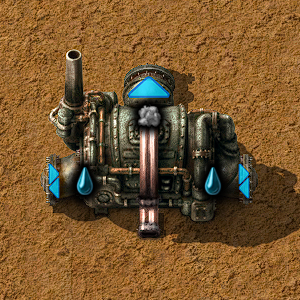Heat exchanger: Difference between revisions
(Added heat capacity info) |
|||
| (15 intermediate revisions by 8 users not shown) | |||
| Line 1: | Line 1: | ||
{{Languages}} | {{Languages}}{{:Infobox:Heat exchanger}} | ||
The '''heat exchanger''' exchanges heat between a heat connection and [[water]] to produce [[steam]]. | |||
{{:Heat exchanger | |||
Heat exchangers produce ~103 steam with a temperature of 500°C every second. | |||
Heat | Heat exchangers will not produce steam until they reach 500°C. The steam produced is exactly 500°C hot, even if the exchanger is hotter. Heat exchangers have a heat capacity of 1 MJ/°C. Thus, they can buffer 500 MJ of heat energy across their working range of 500°C to 1000°C, and require 485 MJ of energy to warm up from 15°C to 500°C when initially placed. | ||
Heat | == Calculating steam production rate == | ||
Heat exchangers produce 103 steam/second.This can be calculated by relying on [[steam turbine]] data: A steam turbine consumes 60 steam/second and produces 5.82MW (assuming 500°C steam). This means a single unit of 500°C steam has <code>5.82MW / (60/s) = 0.097 MJ</code> of energy. A heat exchanger produces 10 MJ a second, therefore it produces <code>10MJ / 0.097MJ = 103.0927835</code> steam per second. | |||
The steam production rate can also be calculated using the energy consumption: 1 Heat exchanger consumes 10MW, so it's putting 10,000,000 joule of energy into heating water/steam per second. To heat up 1 unit of water 1 degree, 200 joules are needed, so the heat exchanger is heating up water by 50,000°C in total. But the water only gets heated up from 15°C to 500°C, so by 485°C. So the 50,000°C are enough to heat up 103 units of steam per second, since <code>50,000 / 485 = 103.09</code>. Since steam is produced from water in a 10:1 ratio, this also means that 10.3 units of water are consumed per second. | |||
== History == | == History == | ||
{{History|2.0.0| | |||
* Decreased water use by 10x, changing the water:steam ratio from 1:1 to 1:10.}} | |||
{{History|0.17.67| | |||
* Heat pipes (also in reactors and heat exchangers) glow with high temperatures.}} | |||
{{History|0.15.0| | {{History|0.15.0| | ||
* Introduced}} | * Introduced | ||
* Doubled the heat capacity of water from 0.1kJ per degree per liter to 0.2kJ}} | |||
== See also == | == See also == | ||
* [[Nuclear power]] | * [[Power production#Nuclear power|Nuclear power]] | ||
** [[Heat pipe]] | * [[Steam turbine]] | ||
* [[Nuclear reactor]] | |||
* [[Heat pipe]] | |||
{{ProductionNav}} | {{ProductionNav}} | ||
{{C| | {{C|Energy}} | ||
Latest revision as of 02:52, 8 November 2024
| Heat exchanger |
|
Recipe |
|||||||||||||
| +++ → | |||||||||||||
|
Total raw |
|||||||||||||
| +++ | |||||||||||||
|
Map color |
|||||||||||||
|
Fluid storage volume |
Input: 200 |
||||||||||||
|
Health |
|
||||||||||||
|
Resistances |
Explosion: 0/30% |
||||||||||||
|
Stack size |
50 |
||||||||||||
|
Dimensions |
2×3 |
||||||||||||
|
Energy consumption |
|
||||||||||||
|
Heat output |
|
||||||||||||
|
Maximum temperature |
1000 °C |
||||||||||||
|
Fluid consumption |
|
||||||||||||
|
Mining time |
0.1 |
||||||||||||
|
Prototype type |
|||||||||||||
|
Internal name |
heat-exchanger |
||||||||||||
|
Required technologies |
|||||||||||||
|
Produced by |
|||||||||||||
The heat exchanger exchanges heat between a heat connection and water to produce steam.
Heat exchangers produce ~103 steam with a temperature of 500°C every second.
Heat exchangers will not produce steam until they reach 500°C. The steam produced is exactly 500°C hot, even if the exchanger is hotter. Heat exchangers have a heat capacity of 1 MJ/°C. Thus, they can buffer 500 MJ of heat energy across their working range of 500°C to 1000°C, and require 485 MJ of energy to warm up from 15°C to 500°C when initially placed.
Calculating steam production rate
Heat exchangers produce 103 steam/second.This can be calculated by relying on steam turbine data: A steam turbine consumes 60 steam/second and produces 5.82MW (assuming 500°C steam). This means a single unit of 500°C steam has 5.82MW / (60/s) = 0.097 MJ of energy. A heat exchanger produces 10 MJ a second, therefore it produces 10MJ / 0.097MJ = 103.0927835 steam per second.
The steam production rate can also be calculated using the energy consumption: 1 Heat exchanger consumes 10MW, so it's putting 10,000,000 joule of energy into heating water/steam per second. To heat up 1 unit of water 1 degree, 200 joules are needed, so the heat exchanger is heating up water by 50,000°C in total. But the water only gets heated up from 15°C to 500°C, so by 485°C. So the 50,000°C are enough to heat up 103 units of steam per second, since 50,000 / 485 = 103.09. Since steam is produced from water in a 10:1 ratio, this also means that 10.3 units of water are consumed per second.
History
- 2.0.0:
- Decreased water use by 10x, changing the water:steam ratio from 1:1 to 1:10.
- 0.17.67:
- Heat pipes (also in reactors and heat exchangers) glow with high temperatures.
- 0.15.0:
- Introduced
- Doubled the heat capacity of water from 0.1kJ per degree per liter to 0.2kJ
